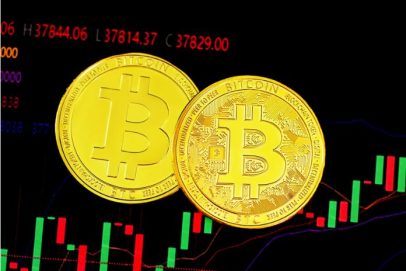Why Trading Volumes Are Key To Understanding The Crypto Market?

Do you understand trading volumes? We don’t think anybody does. But they’re a critical indicator for crypto trading. The trading volume is easy to find. If you look to buy bitcoin now, you’ll usually find the 24-hour trading volume.
For Bitcoin, the current 24-hour trading volume is $18.75 billion – you won’t find higher than that with other coins. If you Google the coin you’re interested in, you should be able to find the trading volume history. Below, we’ll tell you a bit more about trading volumes and how they work.
How Does The Cryptocurrency Market Operate?
The cryptocurrency market is a vast network of decentralized transactions. It’s completely different from any traditional financial system you understand (or don’t understand).
Operating 24/7, traders can invest at any point, if they know how to. This market thrives on blockchain technology. Well, not thrives. That’s the only thing it relies on to function. That, and a ton of energy. But we won’t get into that.
Cryptocurrencies like Bitcoin, Ethereum, and various altcoins form the crux of this market, each with its unique blockchain. Price volatility is a hallmark of this market, driven by investor sentiment, technological advancements, and regulatory changes. Understanding this dynamic ecosystem is vital for anyone venturing into crypto trading or investment.
The Genesis Of Trading Volumes In Cryptocurrency Markets
Trading volumes in cryptocurrency markets originate from the collective activities of buyers and sellers. They’ll start low and gradually increase. Or there are the crypto unicorns – they start high and stay high until they crash and ruin everyone’s life.
These volumes happen when individual and institutional traders execute buy and sell orders. Initially, it’ll be when a new cryptocurrency is listed on an exchange, attracting initial interest from investors and traders. The volumes further fluctuate based on market sentiment, news, technological developments, and broader economic factors.
High-profile endorsements or adoption by major companies can also kick-start significant trading activity. Understanding the inception and evolution of this helps you grasp the market’s momentum and potential future trends.
What Are Trading Volumes?
Trading volumes in the cryptocurrency market are a crucial metric. They offer deep insights into the market’s strength and direction. They represent the total value of all executed trades within a given timeframe and are used to assess the market’s activity level and investors’ interest. High trading volumes typically indicate a strong market with active participation. You’d assume there’s a healthy demand for the cryptocurrency. Remember, assume.
Low trading volumes may signal a lack of interest or uncertainty among investors, often leading to price stagnation or volatility. But the thing to remember is – low trading volumes can be as temporary as a few hours. But those few hours are enough to send people into mass panic. And it’s essential to remember that low trading volumes have a reason – more on that in the next section.
In a market as dynamic and fast-paced as cryptocurrency, monitoring this becomes essential for understanding market trends. You’ll begin to learn how to interpret price movements.
What Influences Trading Volumes?
The question should be, what doesn’t influence trading volumes? Sometimes, you don’t even know what has influenced a trading volume – it’s the mythical crypto gods.
Most often, it’s market sentiment. Market sentiment follows the news. The news follows technological innovations and drama. Technology follows global economic conditions. There’s a block-chain reaction (pun intended). Regulatory announcements or government policies around cryptocurrencies, good or bad, are substantial shifts in trading activity. Major technological advancements or updates within blockchain networks, such as forks or protocol upgrades, influence trading volumes. The involvement of institutional investors, bringing substantial capital, can markedly increase trading volumes.
Well, the list could go on. This YouTube video explains it in more depth.
Why Trading Volumes Are Key To Understanding the Crypto Market
Trading volumes are crucial. They indicate activity and market sentiment. High volumes often signal strong interest or confidence in a particular cryptocurrency, possibly leading to price increases. Or, in proper crypto terminology, a bullish run.
On the other hand, low volumes might suggest reduced interest or uncertainty, potentially leading to price decline. Or, in proper crypto terms, a bearish run.
Volumes also provide insights into market maturity and the presence of institutional players. A market with consistently high volumes is likely more stable. These attract serious and large-scale investors.
By analyzing volume trends and price movements, traders can better understand market dynamics and investor behavior.
But don’t worry, half of the time, nobody has a clue what’s happening.
What Coins Have The Biggest Trading Volumes
Coins with the largest trading volumes are your major cryptocurrencies, like Bitcoin and Ethereum. They’re widely recognized and extensively traded. You’ll notice these fluctuate a lot, but the trading volume pretty much remains the same until there’s a bullish or bearish trend on the move. These high volumes reflect their established status in the market and investor trust.
However, altcoins like Binance Coin, Cardano, and Ripple’s XRP also frequently register significant trading volumes – there’s a growing interest in altcoins, and market value and volume are increasing. Large volumes in these coins suggest they are becoming mainstream assets within the crypto space.
Well, that, and they’re constantly in the news. Then again, so is SHIB, but that isn’t very popular. Well, don’t let the SHIB mafia hear us say that.
If you understand trading, you’ll understand a lot about the cryptocurrency market. You can understand its market position, liquidity, and really, how good it is. Still, don’t let that fool you – temporary market volume is a silent crypto killer. You should understand it alongside other market indicators. It’ll enhance a trader’s ability to make informed decisions.
